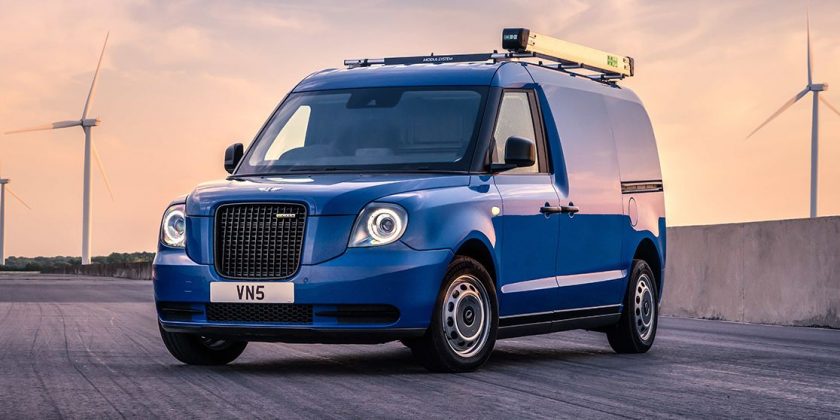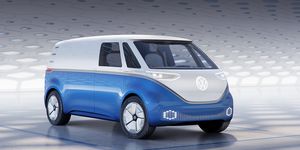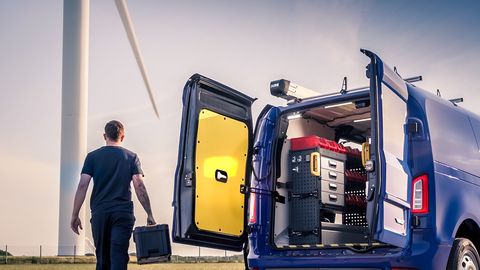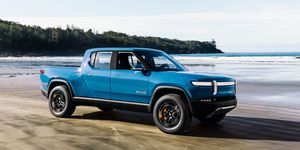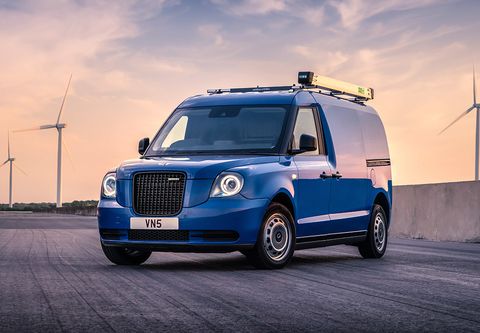
Electric vans already have a head start on electric pickup trucks. And there is good reason to expect that they will maintain their lead for the next two years, even as over half a dozen automakers and EV startups ready their truck models. Despite the recent focus on Mercedes-Benz and Rivian, which have been contracted to supply tens of thousands of battery electric vans to Amazon, there are far more EV van startups overseas without a U.S. footprint that we don’t see, and one of them is London Electric Vehicle Company. Its electric van design could be called dual-purpose, for a reason.
LEVC started out in the EV field by developing a range-extended electric taxi for London, styled after the familiar, decades-old London cab design. And it didn’t take much to convert the taxi cab to a utility van, one which the company plans to put into production by the end of the year promising a combined gas-electric range of over 300 miles, 58 of which are expected to be pure-electric. The EV maker has already opened orders for a right-hand drive version, with deliveries scheduled for the end of 2020, while the left-hand drive version is expected to hit the market in the first quarter of 2021.
Dubbed VN5, this electric panel van has a gross payload of 1,830 lbs and can accommodate two standard Euro pallets, which can be loaded either through the back or even the side door. The front of the VN5 shares its design the taxi model, which was launched back in 2018.
The VN5 is expected to feature the same battery capacity as the TX cab, which is 31 kWh. Designed for DC fast charging ability, the VN5 will be able to juice up in a matter of minutes if needed. The interior will feature a nine-inch touchscreen infotainment system, while advanced driver assist aides will include automatic emergency braking. The company plans to offer the VN5 in three flavors: Business, City and Ultima, with a starting price landing at the equivalent of $59,000.
Will this price of entry be low enough to tempt commercial van users to switch to range-extended electrics, or will they stick with gas and diesel vans and wait until our battery-electric utopia arrives?
Mercedes and Volkswagen are already fielding battery electric vans, and aim to offer more in the coming years, seeking to make them competitive with panel vans with small diesel engines that are preferred all over Europe.
“VN5 sets new green mobility standards in the industry and establishes a new and highly desirable electric van segment,” LEVC CEO Joerg Hofmann. “We’ve applied our extensive knowledge from the taxi world to create a high quality, hard-working van with zero emissions and long-distance capability. As well as offering favourable (favorable) operating benefits, VN5 fulfills the growing demand from both businesses and consumers for cleaner, more sustainable commercial vehicles.”
Of course, a bigger question for businesses in need of city vans that will be covering well under 100 miles a day, as many vans of this type in cities like London and Berlin, is whether to buy a plug-in hybrid van or to buy a battery-electric one from the start.
Even in countries like the U.K., EV charging infrastructure could be better, so manufacturers know that many commercial van buyers aren’t ready to switch to battery-electric vans just yet. LEVC’s VN5 bypasses range anxiety entirely in case a driver needs to make a round trip greater than 60 miles, so there is a lot to like about a van that can rely entirely on its battery for short trips, but also be able to go on longer jaunts when needed.
Will range-extended PHEV vans be the stepping stone for commercial van users for the next decade, until the EV charging infrastructure and battery tech catches up? Unless you’ve got a set daily route that you never exceed, range-extended electric vans can seem like just the ticket for users in Europe who are open to ditching diesels. Now, all we need to do is wait for them to appear in the U.S. in large numbers.
Source: Read Full Article
